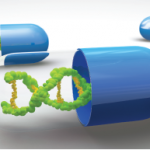These offspring exposed to either maternal infection or IL-6 had improved survival when infected with Salmonella, but they were more susceptible to developing non-infectious intestinal inflammation. The authors concluded that an infectious-driven host imprinting occurs in the offspring during maternal infection. Further, this imprinting may provide protective immunity from future infections, but at the expense of an increased predisposition for non-infectious inflammatory disorders.
Immune Dysregulation & Autoinflammation
Borrowing a term from her colleagues in clinical immunology, Dr. Vogel displayed several recent papers on Hot New Defects, specifically focused on recent discoveries in immune dysregulation and autoinflammation. She selected one paper to discuss in detail, Taft et al., which describes four patients from three families with deficiency in TANK binding kinase 1 (TBK1).7 TBK1 is considered important in innate immunity and is involved in proper responses to viruses, so a deficiency in TBK1 would be expected to cause defective immune response to viral infection, she explained.
However, the authors presented cases of absolute or functional defects in TBK1, which resulted in significant autoinflammation and underlined the role of TBK1 downstream of tumor necrosis factor (TNF) signaling. Anti-TNF therapy seems to be an effective therapy for these patients.
She explained that these “experiments of nature” continue to unveil the complexities of the immune system, and this specific study has taught us more about cell-death regulation pathways downstream of TNF signaling.
ADA2 Genetic Variants
Dr. Vogel ended with a study by Jee et al. in which investigators looked at functional studies of adenosine deaminase 2 (ADA2) activity from samples with known ADA2 genetic variants.8 The researchers included population variants, as well as pathogenic variants associated with the autoinflammatory disease known as deficiency of adenosine deaminase 2 (DADA2).
Their results demonstrated a full spectrum of variant impact on ADA2 activity. They also showed a correlation between plasma ADA2 activity and the measured in vitro activity. These findings suggest that functional assays may prove beneficial in future interpretations of ADA2 variants and allow for further understanding of DADA2.
In Sum
This year-in-review session highlighted many exciting discoveries in the basic and translational sciences related to pediatric rheumatology. Dr. Vogel discussed advances in genetics, autoinflammation and immune dysregulation as well as several studies that enhance our understanding of the pathogenesis of lupus, arthritis and other rheumatic diseases.
These breakthroughs may pave the way for improved subgrouping of diseases, new diagnostic tools and novel therapeutic targets for pediatric rheumatology patients.


